Industrial music is a genre of music that draws on harsh, mechanical, transgressive, or provocative sounds and themes. AllMusic defines industrial music as the "most abrasive and aggressive fusion of rock and electronic music" that was "initially a blend of avant-garde electronics experiments and punk provocation." The term was coined in the mid-1970s with the founding of Industrial Records by members of Throbbing Gristle and Monte Cazazza. While the genre name originated with Throbbing Gristle's emergence in the United Kingdom, artists and labels vital to the genre also emerged in the United States and other countries.

Throbbing Gristle were an English music and visual arts group formed in Kingston upon Hull by Genesis P-Orridge and Cosey Fanni Tutti, later joined by Peter "Sleazy" Christopherson and Chris Carter. They are widely regarded as pioneers of industrial music. Evolving from the experimental performance art group COUM Transmissions, Throbbing Gristle made their public debut in October 1976 in the COUM exhibition Prostitution, and released their debut single "United/Zyklon B Zombie" and debut album The Second Annual Report the following year. P-Orridge's lyrics mainly revolved around mysticism, extremist political ideologies, sexuality, dark or underground aspects of society, and idiosyncratic manipulation of language inspired by the techniques of William S. Burroughs.

Genesis Breyer P-Orridge was an English singer-songwriter, musician, poet, performance artist, visual artist, and occultist who rose to notoriety as the founder of the COUM Transmissions artistic collective and lead vocalist of seminal industrial band Throbbing Gristle. They were also a founding member of Thee Temple ov Psychick Youth occult group, and fronted the experimental pop rock band Psychic TV.

Peter Martin Christopherson was an English musician, video director, commercial artist, designer and photographer, who was at one time a member of British design agency Hipgnosis.
COUM Transmissions was a music and performance art collective who operated in the United Kingdom from 1969 through to 1976. The collective was influenced by the Dada and surrealism artistic movements, the writers of the Beat Generation, and underground music. COUM were openly confrontational and subversive, challenging aspects of conventional British society. Founded in Hull, Yorkshire, by Genesis P-Orridge, other prominent early members included Cosey Fanni Tutti and Spydeee Gasmantell. Part-time members included Tim Poston, Brook Menzies, Haydn Robb, Les Maull, Ray Harvey, John (Jonji) Smith, Foxtrot Echo, Fizzy Paet, and John Gunni Busck. Later members included Peter "Sleazy" Christopherson and Chris Carter, who together with P-Orridge and Tutti went on to found the pioneering industrial band Throbbing Gristle in 1976.

Geoffrey Nigel Laurence Rushton, better known under the pseudonyms John Balance or the later variation Jhonn Balance, was an English musician, occultist, artist and poet.
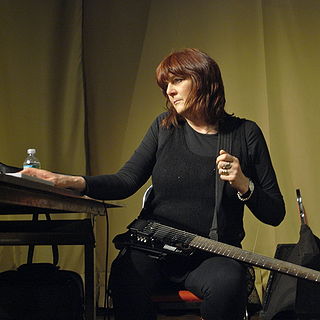
Cosey Fanni Tutti is an English performance artist, musician and writer, best known for her time in the avant-garde groups Throbbing Gristle and Chris & Cosey.
Paula P-Orridge, also known as Alaura O'Dell, is an English musician, writer and entrepreneur.
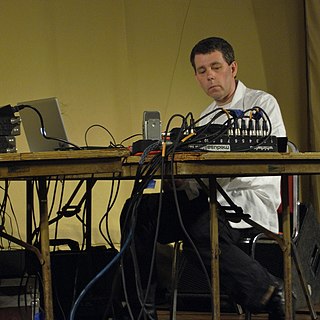
Chris Carter is an English musician, best known for being a member of Throbbing Gristle and the duo Chris & Cosey, both with his longtime partner Cosey Fanni Tutti.

Chris & Cosey, sometimes known as Carter Tutti, are a musical duo formed in 1981, consisting of couple Chris Carter (electronics) and Cosey Fanni Tutti, both previously members of industrial music pioneers Throbbing Gristle. Since the release of their 1981 debut album Heartbeat, the group have expanded on the rhythmic ideas of Throbbing Gristle while adding synthesized pop elements to their sound.

Part Two is an album by English industrial band Throbbing Gristle, released in 2007 through record label Mute Records.

Heathen Earth is a live album by the English industrial band Throbbing Gristle, released in 1980 through Industrial Records.

"United/Zyklon B Zombie" is the debut single by industrial band Throbbing Gristle. It was released in 7" vinyl format in May 1978, through the band's own Industrial Records.
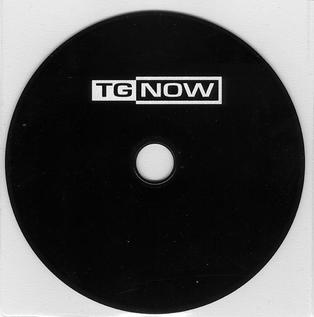
TG Now is an album by English industrial band Throbbing Gristle. It was released in 2004 through the band's own record label Industrial Records and was their first album of original material since 1982's Journey Through a Body.
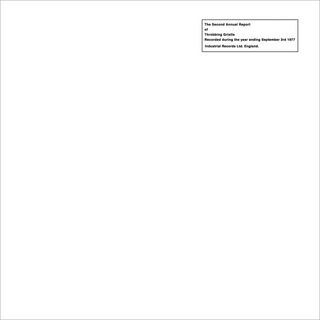
The Second Annual Report is the debut album by English industrial music group Throbbing Gristle, released in November 1977 through Industrial Records. It contains live and studio recordings made from October 1976 to September 1977. The Second Annual Report is considered one of the first industrial albums.

D.o.A: The Third and Final Report of Throbbing Gristle is the second studio album by English industrial band Throbbing Gristle. It was released in 1978 by their Industrial Records label.

The First Annual Report is a bootleg album of music recorded by industrial music pioneers Throbbing Gristle in 1975. The recording originally went unreleased, and the band instead decided to release The Second Annual Report in 1977. This recording was first released unofficially in 1987 as Very Friendly through Spurt Records, before being issued prominently as The First Annual Report in 2001.

In the Shadow of the Sun is an improvised musical score by Throbbing Gristle for the 1981 Derek Jarman film of the same name.
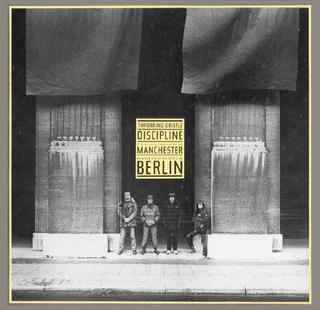
"Discipline" is a song by the English electronic group Throbbing Gristle.
Other, Like Me: The Oral History of COUM Transmissions and Throbbing Gristle, also shorter titled Other, Like Me, is a 2020 American-British documentary film on the music and art groups Throbbing Gristle and COUM Transmissions, which covers the history of both projects in archival film footage and photos and interviews with their members.
















